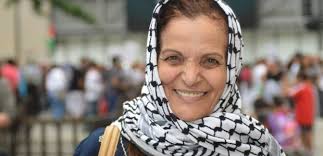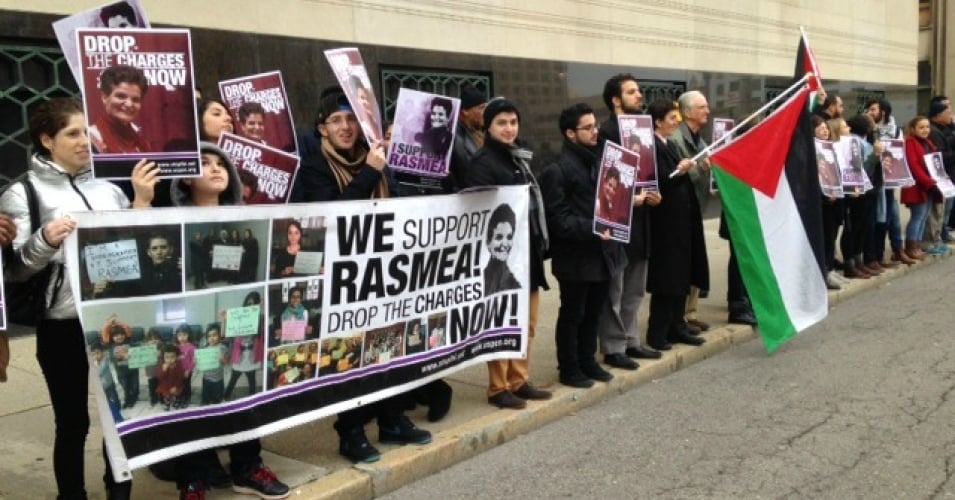Leading Palestinian-American Activist Rasmea Odeh Now a U.S. Political Prisoner

Palestinian activist and torture survivor Rasmea Odeh was found guilty of an immigration violation on Monday by a U.S. federal jury in Detroit, following what her supporters say was an unjust trial for trumped up charges aimed at crushing political movements.
“Make no mistake. Rasmea came under attack by the U.S. government because she is Palestinian and because for decades she has organized for Palestinian liberation and self-determination, the Right of Return, and an end to U.S. funding of Israeli occupation,” reads a statement from the Rasmea Defense Committee issued immediately following the verdict.
Presiding Judge Gershwin Drain revoked the 67-year-old’s bond, and Odeh was immediately taken into custody. She will remain incarcerated until her sentencing hearing.
Torture in Israel, Crackdown in the U.S.
In 1969, then 21-year-old Odeh was living in the West Bank city of Ramallah as a refugee from her home village of Lifta when she was arrested by Israeli soldiers and held for 25 days. During her detention, Israeli interrogators elicited what Odeh says is a false confession obtained through torture—including beatings, sexual assault, and death threats. Odeh soon after retracted the confession, but nonetheless she was convicted in an Israeli military court of participating in a series of bombings that led to the deaths of two civilians. She denies any involvement in the acts of which she was convicted.
Israeli military tribunals convict Palestinians at a rate of 99.74 percent, according to the National Lawyers Guild. Torture of Palestinians under Israeli detention, including children, is well documented.
After ten years incarcerated by Israel, Odeh was released as part of a prisoner exchange. She moved to Jordan and eventually relocated to the United States—first to Detroit and later to Chicago. She became a naturalized U.S. citizen in 2004.
Since her release from Israeli prison, Odeh has been an active and prominent campaigner for Palestinian rights and has testified to the United Nations in Geneva, human rights organizations, and media outlets about her torture and its ongoing impacts, for which she has since been diagnosed with Post-Traumatic Stress Disorder. Odeh has been active for years in Chicago’s Arab American Action Network, leading its Arab Women’s Committee, which focuses on empowering Arab immigrant women. In 2013, she was granted the Mosaic Award for Outstanding Community Leadership from the Chicago Cultural Alliance.
But last October, Odeh was arrested from her home in the Chicago suburbs by Department of Homeland Security agents and indicted for allegedly failing to disclose on her visa and naturalization applications her conviction in Israeli military courts.
Supporters rally for Rasmea Odeh outside of the federal court in Detroit on Monday. (Photo courtesy of Jess Sundin)
Odeh’s legal defense attorney says that she did not intentionally provide false answers, but rather, believed the questions only pertained to convictions in the United States.
Critics charge that Odeh’s arrest and subsequent trial was part of a broad crackdown on Palestinian rights campaigners across the midwestern United States. “The immigration charge is really nothing but a pretext,” Hatem Abudayyeh, spokesperson for the Rasmea Defense Committee and member of the United States Palestinian Community Network, told Common Dreams. “The long arm of law enforcement goes after social justice movements doing effective and impactful work.”
“Defense Cut Off at the Knees”
According to Odeh’s defense committee, the Odeh’s subsequent trial was a “travesty of justice.”
Despite acknowledging Odeh’s charges of torture as “credible,” Drain ruled that this torture could not be brought up at the trial. As a result, Odeh’s attorneys “had to scrap plans to call to the stand an expert witness, clinical psychologist Dr. Mary Fabri, who has decades of experience working with torture survivors, to testify that the allegedly false answers on the immigration forms were the result of Rasmea’s chronic Post-Traumatic Stress Disorder,” according to a statement from her defense committee.
“He allowed evidence gathered by Israelis when they viciously tortured and raped Rasmea in prison in 1969, but he would not allow Rasmea to prove she had chronic PTSD and that she was tortured,” said Abudayyeh. “At that point, our defense was cut off at the knees.”
Journalist Charlotte Silver, who has reported on the trial, wrote Monday that the jury did not wish to speak with the defense team after the hearing, yet spoke with the government prosecutors for thirty minutes. “That’s the kind of jury we had: they were kept ignorant of 75 percent of our defense and then they didn’t even want to hear from us at the end,” lead defense attorney Michael Deutsch told supporters.
“We Will Fight for Justice”
Throughout the trial and the lead-up, Odeh was met with an outpouring of support as her case took on national prominence.
“We had organizing call-in days across the country at least once a month where we would bombard the U.S. attorney’s office in Detroit with calls demanding they drop the charges,” said Abudayyeh. “We gathered over 100 letters of support. We also organized a number of rallies and protests at federal buildings across the country, from Florida to Utah to New York to New Jersey. We brought approximately 200 people to Detroit over her four day trial.”
Odeh today was found guilty of one count of Unlawful Procurement of Naturalization, which her legal team has pledged to appeal. Meanwhile, she awaits sentencing from the court, facing up to 10 years in prison and loss of her U.S. citizenship.
Immediately following her verdict, before her bond was revoked, Odeh went outside to address her supporters. Speaking to them on a bullhorn, she said, “Thank you for supporting me. We can find justice in some place, maybe not in this court, maybe in another place. There is justice in this world. We will find it… We will fight for justice.”
Comments and updates are being posted to Twitter:


